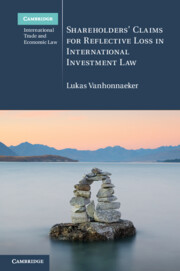
- Cited by 30
-
Cited byCrossref Citations
This Book has been cited by the following publications. This list is generated based on data provided by Crossref.
2020. Shareholders' Claims for Reflective Loss in International Investment Law. p. 356.
2020. Shareholders' Claims for Reflective Loss in International Investment Law. p. 54.
2020. Shareholders' Claims for Reflective Loss in International Investment Law. p. 337.
2020. Shareholders' Claims for Reflective Loss in International Investment Law. p. 283.
2020. Shareholders' Claims for Reflective Loss in International Investment Law. p. 1.
2020. Shareholders' Claims for Reflective Loss in International Investment Law. p. 238.
2020. Shareholders' Claims for Reflective Loss in International Investment Law. p. 32.
2020. Shareholders' Claims for Reflective Loss in International Investment Law. p. 387.
Vanhonnaeker, Lukas 2020. Shareholders' Claims for Reflective Loss in International Investment Law.
2020. Shareholders' Claims for Reflective Loss in International Investment Law. p. 93.
2020. Shareholders' Claims for Reflective Loss in International Investment Law. p. 350.
2020. Shareholders' Claims for Reflective Loss in International Investment Law. p. 14.
2020. Shareholders' Claims for Reflective Loss in International Investment Law. p. 206.
2020. Shareholders' Claims for Reflective Loss in International Investment Law. p. xv.
2020. Shareholders' Claims for Reflective Loss in International Investment Law. p. 164.
2021. Digital Services in International Trade Law. p. 7.
2021. Digital Services in International Trade Law. p. 55.
2021. Digital Services in International Trade Law. p. 34.
2021. Digital Services in International Trade Law. p. 371.
2021. Digital Services in International Trade Law. p. 181.
- Publisher:
- Cambridge University Press
- Online publication date:
- July 2020
- Print publication year:
- 2020
- Online ISBN:
- 9781108784023


